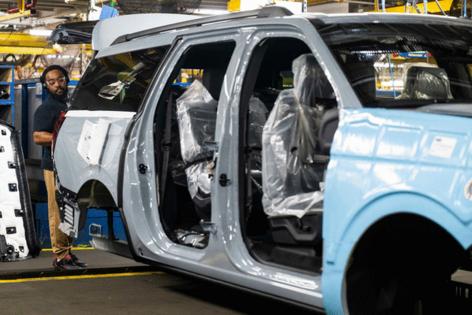Ford CEO Farley says industry needs more tariff help, urges rivals to build US plants
Published in Business News
LOUISVILLE, Kentucky — Ford Motor Co. CEO Jim Farley said Wednesday that President Donald Trump's actions this week to scale back auto tariffs will ease the burden on automakers, suppliers and consumers, but that the industry needs more relief to be "healthy and growing."
Farley said addressing tariffs on vehicle parts and offering credits on duties for manufacturers exporting product from the United States should be priorities moving forward.
"We are not there yet," he said during an event at Kentucky Truck Plant in Louisville marking the launch of the fifth-generation Ford Expedition full-size SUV.
Farley also touted the fact that Ford produces 80% of its vehicles for sale in the United States in its home country and issued a veiled challenge to Ford's domestic rivals, General Motors Co. and Stellantis NV, to match his company's level of domestic output. If other automakers matched Ford's U.S. production levels, he said, there would be another 15 assembly plants in the United States.
"We must keep working until those 15 new assembly plants are built in our country by our competitors," he said. "That's hundreds of billions (of dollars). Or will it be we absorb it (the tariffs), and our government helps us, or do we pass on the price onto the customers and the industry shrinks?
"In the last case," he continued, "Ford wins, because we won't have the same tariff exposure because of our localization, and we'll be able to order more product."
Trump took action on Tuesday to stop 25% duties on vehicles and certain parts from stacking on aluminum and steel tariffs as well as general import taxes on Canada and Mexico. Vehicles and parts compliant with the U.S.-Mexico-Canada trade agreement that Trump signed in 2020 already were exempt from the Canada and Mexico tariffs.
He additionally signed a proclamation that allows automakers manufacturing in the United States to partially offset duties on auto parts for the next two years.
Farley said the automaker is "80% localized and 75% U.S. content."
The National Highway Traffic Safety Administration American Automobile Labeling Act's says the Michigan-built Ford Ranger has 46% U.S. and Canadian content, the highest of its vehicles. The Mexico-built Mustang Mach-E has the highest North American content at 91%, with 78% Mexican content.
Under changes Trump made to auto tariffs this week, a vehicle made in the United States with 85% U.S. and USMCA content would see no tariffs.
The 2025 Expedition sources 42% of its content from the United States and Canada and 22% from Mexico. That's 64% from the North American countries. More than 360 U.S. suppliers in 30 states contributed to the new Expedition.
When asked if tariffs had prompted any changes in sourcing ahead of the Expedition launch, Adrian Aguirre, chief program engineer for the Expedition, said developing and launching a vehicle with quality "is all about maintaining stability."
Farley said the automaker is working with its thousands of suppliers, some of whom already are under financial stress on payable terms.
Ford on Wednesday also said it was extending its employee discount pricing program "From America, For America" for consumers through the July 4 weekend. The 2025 Expedition, which starts at $62,000, is exempt from that campaign.
Farley said the company has seen sales increase by double digits in April. The company will report official U.S. deliveries on Thursday.
"For many years, Ford was at a huge disadvantage for our costs, with 80% sourced in the U.S., and that was a big issue for the company," Farley said. "We're trying to make a change. We're trying to remind Americans where things come from."
As for price increases after the July 4 weekend, Farley said it will depend on Ford's competitors and whether they opt to absorb the cost of tariffs or pass them onto consumers.
Ford invested $500 million in Kentucky Truck for the launch. Retooling contributed to a 38% decrease in U.S. Expedition sales in the first three months of 2025. Deliveries grew 6.3% in 2024.
The fifth-generation Expedition unveiled Wednesday comes packed with a split-gate trunk, sliding console, updated cockpit software and more off-road capability in a new Tremor trim to appeal to younger buyers and families.
Kentucky Truck is one of Ford's largest plants, also producing the Lincoln Navigator SUV and Super Duty pickups. The plant employs roughly 9,000 people, including 8,200 hourly workers. In 2023 during the United Auto Workers' strike, Ford disclosed the plant represented about one-sixth of its annual revenues, generating approximately $25 billion each year.
Farley described the plant's revenue as being more than that produced by Southwest Airlines Co.
©2025 www.detroitnews.com. Visit at detroitnews.com. Distributed by Tribune Content Agency, LLC.












Comments